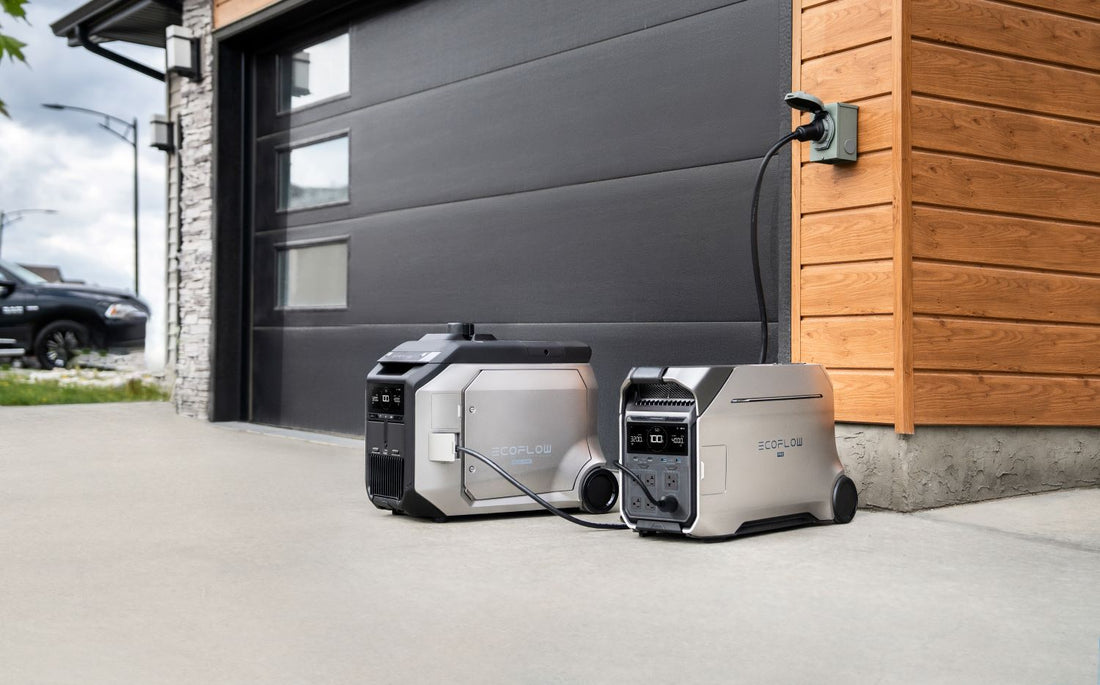
Choosing the Right Power System: Types and Benefits
Share
As more and more people look to add backup power systems to their property, homestead, or cabin, a persistent question is "What should I use to charge my power station?". As you might expect, both have their pros and cons, and whether one or the other is right for you will depend on your specific needs and how you intend to use your power system.
In this article, we’ll walk you through each main option, some of the pros and cons of each, and what you’ll want to consider when making a purchase. Worth noting, we’re taking for granted here that you will be using a battery/inverter combo backup power system, and we’re simply looking to compare the different methods of charging them. For a focused look at gas generators vs solar generators, check out this blog post.
Types of Backup Power Systems
To start off, let’s get a quick overview of the 3 main ways you might set up a power station.
1. Backup Battery-Only Systems
While this article is focused on systems that incorporate a generator component, for some people, just a basic power bank is all that’s needed for their use case. These systems rely on battery storage only and can be used for short-term outages, or are great for things like taking on the road camping, offgrid, or just charging critical systems like phones and small electronics in case of a blackout. These systems are definitely capable of powering whole homes as well, but the size and expense of the batteries needed for that capacity add up quickly. For example, if you want a whole-home system that can store enough power for your entire house for 24 hrs, that’s typically going to require 10-30kWh (including HVAC and all systems), and will cost about $7,000-$20,000.
Fortunately, as you’ll read below, there are a few other options that can be easily paired with a power station to constantly generate power while off-grid.
Pros:
Cons:
2. Backup Systems with Generators
While homes have been adding backup generators for decades, it’s only relatively recently with better battery tech that it’s become reasonable to use a power station as the source of power the house plugs into, and a generator to run periodically to charge the power station. This allows for greater efficiency, and removes the negative of potentially “dirty” current harming sensitive electronics, as the power station outputs consistent, smooth power from the battery.
The real benefits of generators are twofold. The first is the ability to reliably run the generator at any time, in any conditions. Solar power relies on the sun, which is only out half the day in the best conditions, and can negatively impacted heavily by the weather. The second is the ability to much more cheaply store far greater amounts of power. For example, a dual-fuel generator like the EcoFlow Smart Generator 4000 can produce 20kWh of electricity with a small 5 gallon propane tank that costs $50 to buy and $15 to refill, or a few gallons of gasoline. Many homes will have propane tanks of up to 1000 gallons already. To store the same amount of electrical energy in batteries would cost around $10,000-$15,000, depending on the system.
3. Solar Generator Systems
A solar generator system adds in solar panels as the charge mechanism for the power station. The great thing about solar panels is that after the initial up-front cost, charging is free, and always available as long as the sun comes out. The big downside is that for half the day, the sun isn’t charging your panels, and depending on the size of your solar array, your power station may not fully charge if conditions aren’t right, with a full sun day. In short, you’re locked into the amount of power that you can produce and use in a day's time in a way that you’re not with a traditional gas or propane generator.
That said, if you’re in a situation with limited or no access to fuel, or are using your system very regularly or every day, solar can be a great option.
Pros and Cons of Gas Generators
Pros:
Cons:
Pros and Cons of Solar Generators
Pros:
Cons:
Recap
To recap, while both systems absolutely have their weaknesses, both can be excellent options in the right circumstances. If you’re looking for a system that you’re going to be relying on constantly for a long period of time, solar is often going to be the right move, as it’s very low-maintenance, and free to run once it’s purchased and set up. It can also be great for very light-weight systems (backpack size etc), as they can be shrunk much smaller than gas generators. That said, if you’re looking for a unit that you’ll use purely as a backup or occasionally, and want the combination of rugged, cheap, and dependable that traditional generators offer, it’s hard to beat a gas/propane generator for that.
